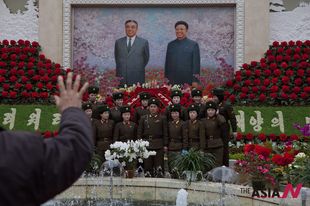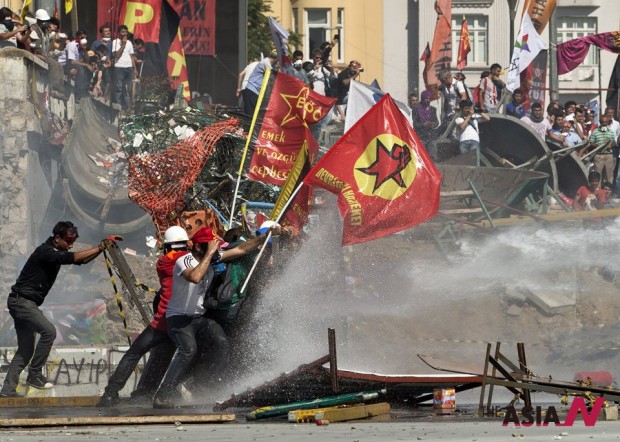
Riot police firing tear gas, water cannon and rubber bullets clashed into the early hours of Wednesday with defiant demonstrators occupying Istanbul’s central Taksim Square and its adjacent park, in the country’s most severe anti-government protests in decades.
The crisis has left Prime Minister Recep Tayyip Erdogan looking vulnerable for the first time in his decade in government, and has threatened to tarnish the international image of Turkey, a Muslim majority country with a strongly secular tradition, a burgeoning economy and close ties with the United States.
Thousands of police moved into the square early Tuesday, pushing past improvised barricades set up by the protesters who have swarmed through the massive square and accompanying Gezi Park in their tens of thousands for the past 12 days.
Police fired repeated rounds of tear gas that rose in stinging plumes of acrid smoke from the square in running battles with protesters hurling fireworks, bottles, rocks and firebombs. In a cat-and-mouse game that lasted all day, the police repeatedly cleared the square, only for demonstrators to return.
More than 30,000 converged on the square again as dusk fell and were repelled by water cannon, rubber bullets and tear gas after Istanbul’s governor, Huseyin Avni Mutlu, said the police came under attack by “marginal groups.”
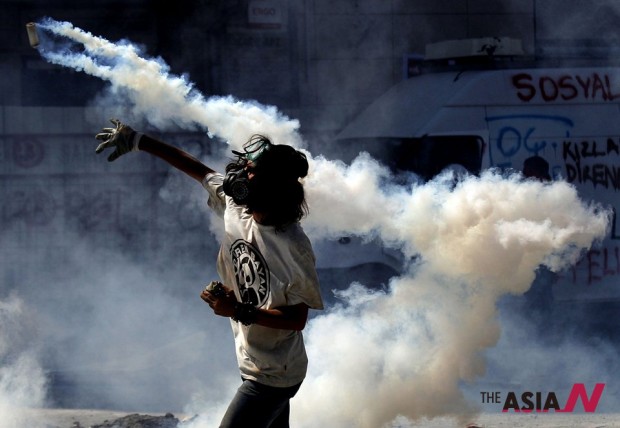
The area reverberated with the echoes of exploding tear gas canisters into the night, while volunteers ferried dozens of injured people to waiting ambulances.
A peaceful demonstration against Gezi Park’s redevelopment that began more than two weeks ago has grown into the biggest test of Erdogan’s authority in his decade of power, sparked by outrage over a violent police crackdown on May 31 against a peaceful sit-in in the park.
The unrest has spread to 78 cities across the country, with protesters championing their objections to what they say is the prime minister’s increasingly authoritarian style and his perceived attempts to impose a religious and conservative lifestyle on a country with secular laws – charges he rejects.
Four people have been killed, including a policeman, and about 5,000 have been treated for injuries or the effects of tear gas, according to the Turkish Human Rights Foundation.
Gezi Park, with its thousands of camped-out demonstrators young and old, has become the symbol of the protests. Both the governor and the police initially promised that only Taksim Square would be cleared, not the park.
But late into the night, the governor suggested a more muscular police sweep might be imminent. Tear gas was fired into the park, as protesters scrambled for cover.
“We will open the square when everything normalizes in the area, and our security forces completely control the area,” Mutlu told A Haber news channel. “Our children who stay at Gezi Park are at risk, because we will clean the area of the marginal groups,” he said in distinguishing between troublemakers and peaceful protesters.
“We won’t allow our government to be seen as weak,” Mutlu said.
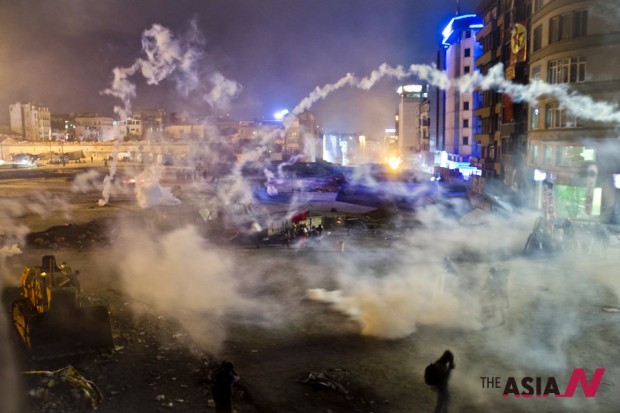
Some 300 miles (500 kilometers) away in Ankara, the capital, police fired water cannon and tear gas to disperse several hundred protesters – some throwing stones – who gathered in sympathy with the Istanbul counterparts.
Tuesday’s clashes came a day after Taksim saw its smallest gathering since the demonstrations began. The government had said Erdogan would meet with some of those occupying the park on Wednesday to hear their views.
“The relative calm yesterday was deceptive,” said Robert O’Daly, Turkey analyst for the Economist Intelligence Unit.
“Mr. Erdogan’s offer of dialogue appears to have been merely tactical. The appearance of riot police in the square this morning and renewed use of teargas against the protesters fits better with his defiant rhetoric,” he said.
Erdogan, a devout Muslim, says he is committed to Turkey’s secular laws and denies charges of an authoritarian manner. As he defended his tough stance, he gave critics little hope of a shift in his position.
“Were we supposed to kneel before them and say, `Please remove your pieces of rags?”‘ he asked, referring to the dozens of banners and flags the protesters had festooned in the square. “They can call me harsh, but this Tayyip Erdogan won’t change.”
Confident of his position of power after winning the last elections in 2011 with 50 percent of the vote, Erdogan has insisted he will prevail. He made it clear that he has come to the end of his patience with the protesters, whom he accused of sullying Turkey’s image abroad and being vandals and troublemakers.
“To those who … are at Taksim and elsewhere taking part in the demonstrations with sincere feelings: I call on you to leave those places and to end these incidents and I send you my love. But for those who want to continue with the incidents I say: `It’s over.’ As of now we have no tolerance for them.”
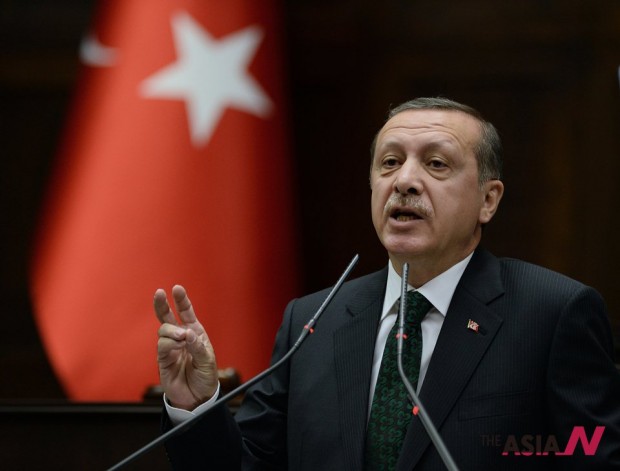
“Not only will we end the actions, we will be at the necks of the provocateurs and terrorists, and no one will get away with it,” he added.
His words, accompanied by the repeated rounds of tear gas that left many choking for breath, seemed to gird the resolve of many in the park rather than weaken it.
“People are definitely going to stay. The more the police attack, the more people come and stay,” said Melda, a 29-year-old cook who rushed to the park Tuesday morning when she heard of the police intervention. Fearful of losing her job for participating in the protests, she asked that her surname not be used.
Melda and a group of friends had originally intended to go and set up a stall giving out cupcakes and sandwiches to the protesters. Instead they arrived with first aid supplies.
She had harsh words for those protesters who had thrown rocks and firebombs at riot police on the square earlier in the day.
“They’re taking advantage of the situation,” she said. “And then the prime minister calls us all terrorists.”
On Tuesday, Erdogan, who has called major pro-government rallies in Ankara and Istanbul this weekend, insisted again that the unrest was part of a conspiracy against his government.
The demonstrators, he said, ” are being used by some financial institutions, the interest rate lobby and media groups to (harm) Turkey’s economy and (scare away) investments.” <AP/NEWSis>




